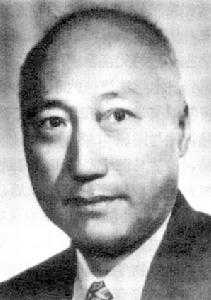Hsien Wu
| Wu Hsien | |
|---|---|
 | |
| Born |
24 November 1893 Fuzhou, Fujian, Qing China |
| Died |
8 August 1959 (aged 65) Boston, United States |
| Nationality | Republic of China |
| Fields | protein science |
Hsien Wu (吳憲, Simplified Chinese 吴宪 and Hanyu Pinyin Wú Xiàn; 24 November 1893 - 8 August 1959) was an early protein scientist who was the first to propose that protein denaturation was a purely conformational change, i.e., corresponded to protein unfolding and not to some chemical alteration of the protein.[1] This crucial idea was popularized later by Linus Pauling and Alfred Mirsky.[2]
Wu was born in Fuzhou, Fujian, China and trained at MIT (undergraduate) then at Harvard University (graduate) under Otto Folin, developing the first assay for blood sugar (Folin-Wu method), then returned to China and a position at Peking Union Medical College, becoming head of the biochemistry department in 1924 at age 30.
Wu left China in 1947 and reside in United States.
Wu's son, Ray J. Wu, became a well-respected professor at Cornell University, the Liberty Hyde Bailey Professor of Molecular Genetics and Biology, and has been active in studying transgenic plants, particularly rice.
References
- ↑ Wu, H (1931). "Studies on Denaturation of Proteins. XIII. A Theory of Denaturation". Chinese Journal of Physiology 5: 321–344. Preliminary reports were presented before the XIIIth International Congress of Physiology at Boston (19–24 August 1929) and in the October 1929 issue of the American Journal of Physiology.
- ↑ Mirsky, AE; Pauling L (1936). "On the Structure of Native, Denatured, and Coagulated Proteins". Proceedings of the National Academy of Science USA 22 (7): 439–447. doi:10.1073/pnas.22.7.439.
Further reading
- Edsall, JT (1995). "Hsien Wu and the First Theory of Protein Denaturation". Advances in Protein Chemistry. Advances in Protein Chemistry 46: 1–5. doi:10.1016/S0065-3233(08)60329-0. ISBN 978-0-12-034246-4.
- Bishop, Charles (1 February 1982). "Hsien Wu (1893-1959): A Biographical Sketch". Clinical Chemistry 28 (2): 378–80. PMID 7035008.
- Wu, DY (1959). Hsien Wu 1893-1959: In Loving Memory. Boston: published privately.
|